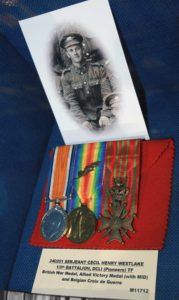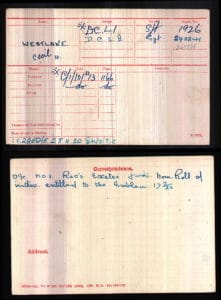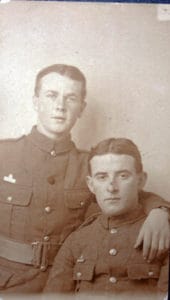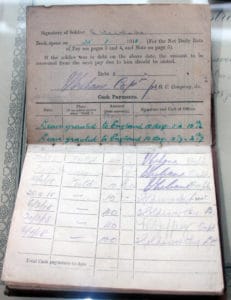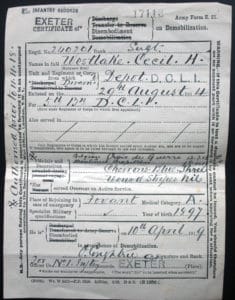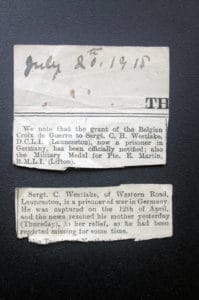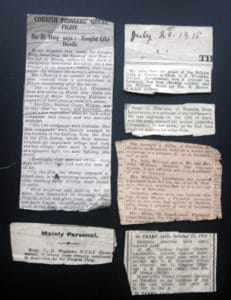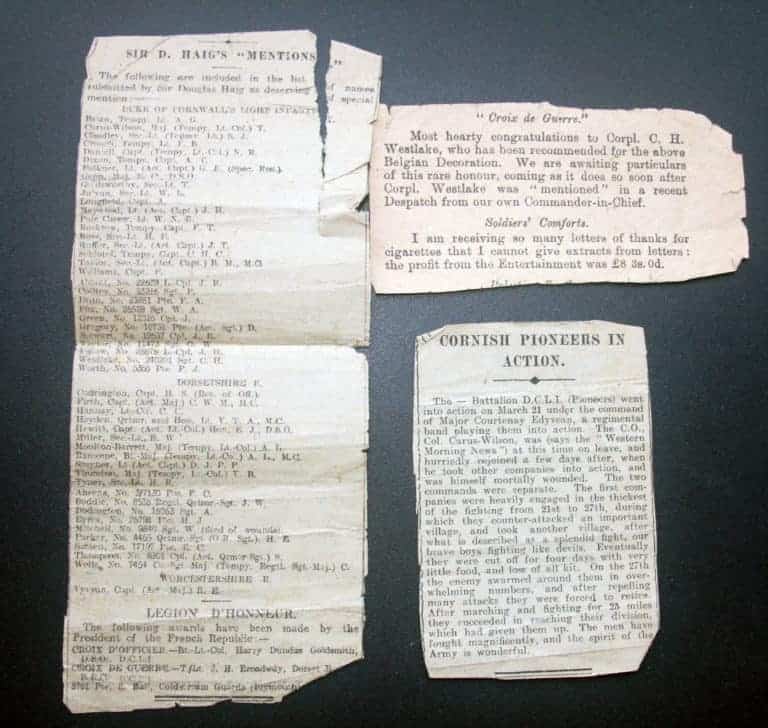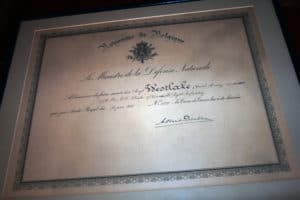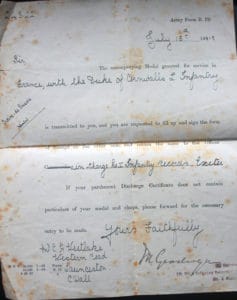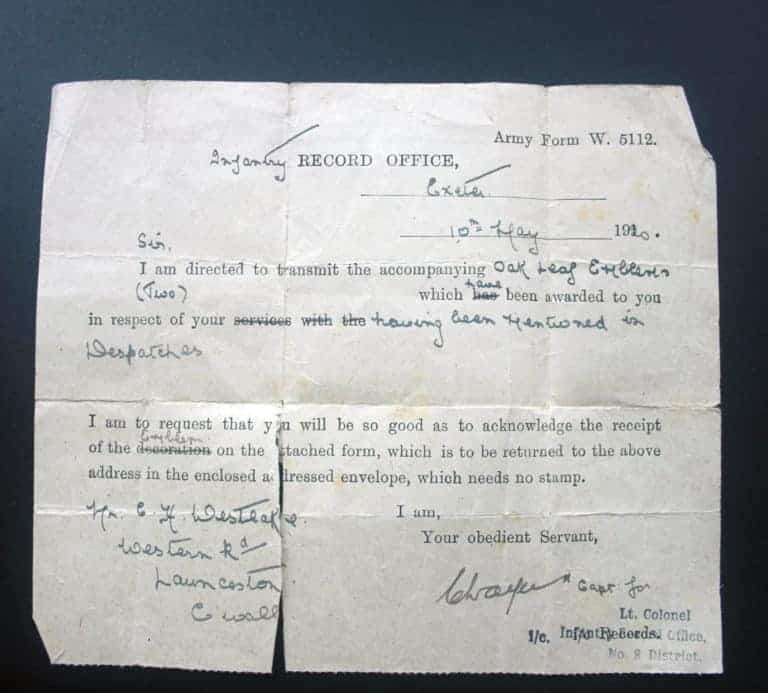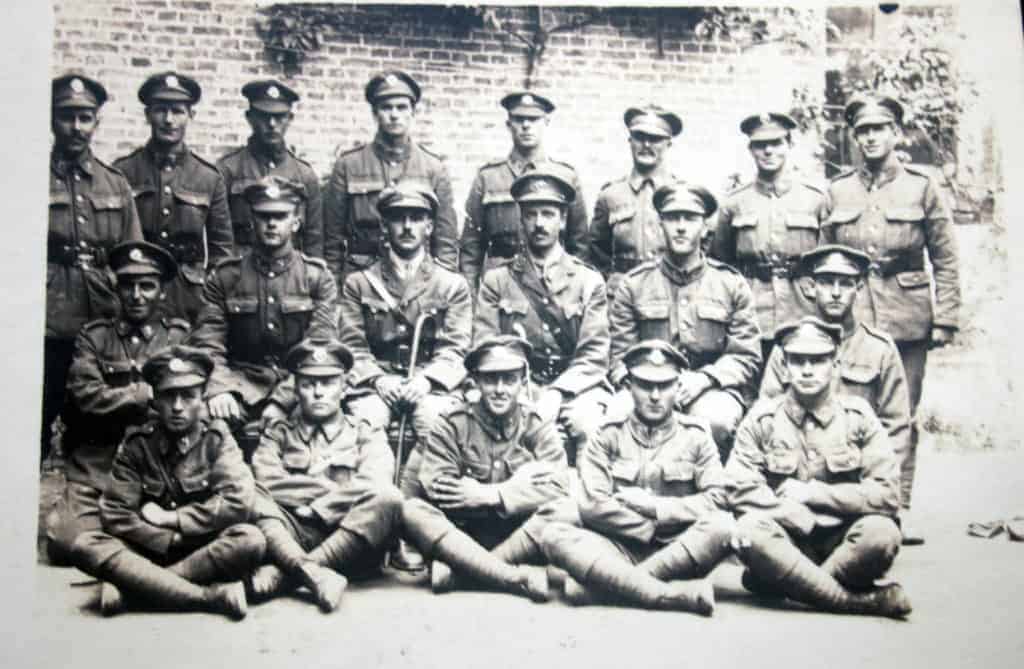.
With special thanks to Pamela Holt and Myra Ellacott Daughter and Niece.
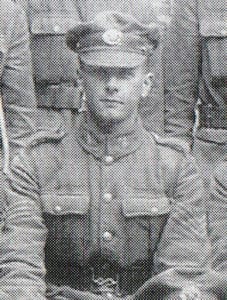
Cecil Westlake was the youngest of three children being born to William and Florence Westlake at Landlake Farm, South Petherwin in 1897. Like his brother Horace (Who was KIA at the Battle of Loos) at the outbreak of World War One, he enlisted joining the Duke of Cornwalls Light Infantry (240201) on the 29th. He served at the western front and achieved rapid promotion finally ending up as Sergeant. He was offered an Officer position but refused as he wanted to remain with his men. Cecil was Mentioned in Dispatches in 1917 (Gazette issue 30434. Mentioned In Despatches.; Deserving of special mention.) He was also awarded the Belgium Croix de Guerre 1st Class in 1918.
He was captured by the Germans when they made a powerful attack in the Leys April 12th 1918 and saw out the remainder of the war as a POW. Due to the poor nutrition, he suffered during his months of captivity he came down with Beriberi. On his release, he met and married Lillian Holley in Croydon, Surrey. He never returned to live in Cornwall, instead settling in Bristol working in Hardware. He never discussed his wartime experiences, but upon his death at the early age of 51 (probably caused by him contracting Beriberi), daughter Pamela found an old diary that he kept notes throughout his internment. Below are a series of transcriptions taken from that old Diary by Brian Edward Holley in his book ‘They went away to war’ (ISBN I 85776 942 2).
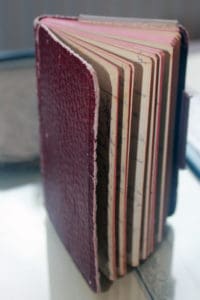
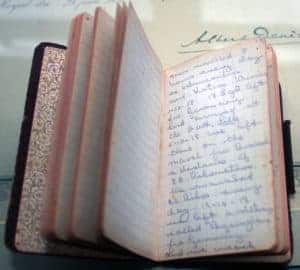
Cecil’s Diary transcription.
Page 5 (or 1)
Captured 12th April at Meville. Assisted a wounded man to dressing station a distance of 2 miles. Treated fairly well. Carried wounded German another 2 miles.
Marched to (not clear, could be Marquille)
12th April. Barley water and a slice of black bread for breakfast the morning 13th 8 a.m. 13th marched to (Wari?). Carrying shells all day from the station to the village. Our airmen had bombed the station the previous night and blew up ammunition, trucks and rails.
Left work at 7 p.m. Marched to (La Heine?) Men slept like pigs in a sty. Nothing to eat all day… Breakfast next morning 14th a slice of black bread and water. Had a wash in a ditch. No soap, no towel. Dinner a drink of barley water. Rusty tin picked up. (This was to be Cecil’s only eating and drinking utensil for the rest of his captivity)
Tea time burnt barley water and a slice of bread. Slept that night as previous one. In morning 15th breakfast barley water, slice of bread. Carried shells all day.
Page 4
Still at same place. Sanitary conditions awful. Remained at nd finished up with 1/3rd .
German guards changed every 14 days. Plenty of (indecipherable) in the camp. We paid for all writing paper half a mark for a packet of five. We sent 4 cards and 2 letters a month. Several of our men escaped which caused a lot of excitement for us. The meat we (page 6) had was either horse flesh or wild boar flesh, whale or porpoise. One of our (cannot decipher) dinners consisted of black bread, peas, maize meal and horse beans.½
Adjoining field on 27.6.18 German plane brought down by one of our airman. We has been writing home for 3 months, on the 3.7.18 we were told none of it had gone.
Page 7 On 5.7.18 the men refused to go to work owing to the awful rotten dinners we had. Officer drew his revolver, all the guards loaded their rifles, but things quietened down.
12.7.18 We were gassed by (cannot decipher) gas from shells. Used blankets for gas masks. Wooden clogs issued in place of boots.
PAGE 8 We had some shirts, tor rags, pants and towels, Austrian trousers, caps (cannot decipher) and some worn outboots given to us. The bandages they used for our men now made of paper. Men were starving, broke into cook house and stole 15 loaves. The camp were punished by having their bread stopped the next day.
The following undated and without page numbers is headed ‘Our Camp’ and it seems appropriate to insert it here where it fits with the above)
It was a French farm, all buildings were partly knocked down, we slept on about 3 feet of manure. The smell was simply awful which caused a lot of sickness. We had nothing to have our meals in. I myself used an old rusty tin which had been lying in the manure heap probably for months. We had some Portuguese troops with us. We had no blankets to sleep with. And in the morning places where it rainthe farm. Men in awful condition. No clean clothes or boots. Several men died in the camp. Men were absolutely weak, dropping down faint. Impossible to say how many men died in hospital. We started with 500 men in the camp (page 5) aed were worse inside than out.
The food we received was not so good as what we should give a pig at home. It was awful, words cannot explain the condition of the men. They were catching moles and eating them. Picking up potatoe peelings from the manure heap and cooking them. If one of the Germans had two or three spoonfuls of his dinner left our boys were that hungry that they would all scramble and fight for it, and the Germans standing laughing at them. Washing in an old ditch the water absolutely black. The sickness was terrific, but still they were made to work.
PAGE 9 Another German plane brought down in flames. One man came down in a parachute. Weather is very wet. Now dinners were made of boiled beetroot.
About a 100 of our planes bombed the village of (cannot decipher looks like Santel) put the wind up Jerry. On 28.8.18 we left the farm and made our camp at (cannot decipher looks like Lesquint) .
Page 10 Men worked 8 hours every day on ammunition and ration dumps. Eighteen sergeants left for Germany arrived at (Dort?) . Lille (Fort McDonald?) . 5.10.18 (Bais??E) we left there on the march for Brussels. A distance of 80 kilometers. We marched 20 kilometers everyday.
9.10.18 entrained at (cannot decipher starts like Hal?) For Gardelegen. 19.10.18 we left a village called (Bysingham?) For (cannot decipher) Germany and we reach (cannot decipher).
Page 11 (name of place cannot decipher) where we get into a passenger train. We reach Gardelegen about 9 p.m the same day.
Next day we received an emergency parcel each, which was a godsend as our rations for the journey had been a slice of bread a day and water. On 24.10.18 we move to (Weshan? OrWerhen? Or Werbian?) An NCO camp where we get another parcel. Then every ten days we get one until the Arnistice is signed and then we get six (groceries?) Each 3 bread and a biscuit parcel. On 17th December three others and myself left the camp and proceeded to Havelberg, a nice little town where we stopped at an hotel called the Kronprinz. Of course we took our own food with us. 9:30 same evening I had a (cannot decipher) time, everything was extra special. Came back to camp next day.
On 22nd December two of our Officers visited the camp, a Major and a Lieutenant. Told us we were leaving for England on Boxing day. We went to Village theatre. Very good. Paid one mark. Christmas Day the Germans had a parade to see whether everyone had the correct clothing. Some of our boys were still away. In the afternoon went to our hotel, went back to tea came out again at six went to same hotel. Played billiards, piano playing and singing. Left camp on 27th and arrived (looks like Stettin.) Embarked on the ‘Dronning Maud’ a Danish Steamer at 9 o’clock. We had two meals on the boat. Disembarked at Copenhagen at 8 o’clock on 29th December. We went to (cannot decipher) by train. We were welcomed by the civilians more than I expected. On 30th we were issued out with khaki and each man received a bath. 6 a.m on the 31st we had a glorious time plenty to eat and plenty of singing and more than we could drink of whisky and soda.on 1st January 1919 I went to a village called (Birkerod?) Some pleasant evenings. Left (cannot read name) for Copenhagen and went aboard ship ‘Frederick VIII’ on 7th January. The first two evenings we’ve a good concert each night. Landed Hull 10 a.m. On 11th went to Ripon 2 days.
That was the last diary entry.
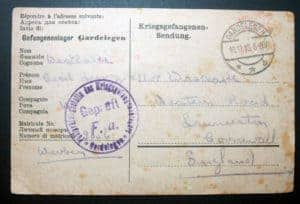
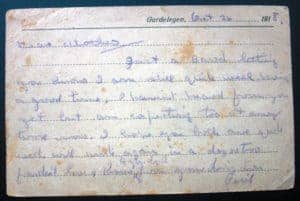
Visits: 190


